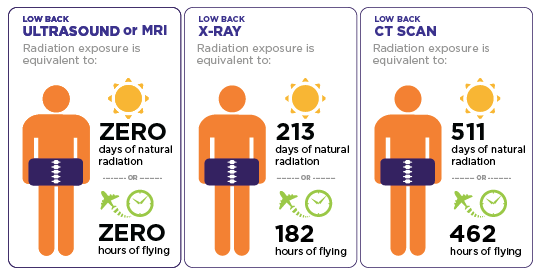In Australia a lot of money is wasted on unnecessary medical tests. This means testing to confirm a diagnosis that is already obvious, and tests where the results won’t change the course of treatment.
A physio example is MRI for knee injuries. Clinical tests I do in the rooms give an accurate diagnosis. An MRI usually isn’t necessary & can be reserved for cases where the surgeon needs to decide on the type of operation to perform. If the knee is not a candidate for surgery, then an MRI isn’t going to change the course of rehabilitation.
Similarly with back and neck pain. Low back pain is the most commonly imaged musculoskeletal complaint. A healthcare professional may send you for an x-ray / CT / MRI to confirm a diagnosis or “rule out” something serious. Unfortunately the imaging rarely adds any additional information, and can actually make things worse.
Back pain is very common. It’s the most common musculoskeletal injury, and essentially everyone will have a sore back at some stage in their lives. Because it’s so common, we know a lot about it.
In nearly all cases, back pain is not serious and we can reach an accurate diagnosis without needing scans. We can rule out the scary, “worst case” diagnoses like fractures, infections, & tumours with some simple questions. We can test for potentially serious “structural” injuries with some simple tests in the rooms. However, back pain is rarely anything structural or serious, and imaging doesn’t add any useful information. Research tells us having a scan doesn’t change the treatment you need, or how fast you recover. We know nearly everyone recovers from back pain without needing a scan.
“Is imaging just a waste of time & money?”
If you’ve got time and money, “what’s the harm?”. Well firstly, X-rays and CT scans expose you to radiation that can potentially cause cancers, so should only be performed when there is a clear benefit. Back X-rays deliver about 65 times more radiation than a chest X-ray. Back CTs expose you to 100 - 500 times the radiation of a chest X-ray. Would you volunteer for 500 X-rays if there wasn’t a clear benefit?
Possibly a bigger concern is, when we start scanning body parts, we see things.
MRIs can look nasty. There’s way too much detail. We see disc degeneration, disc bulges, degenerative joint disease, osteoarthritis, narrowing. But all of this is normal.
A study of adults without any back pain found that two-thirds of us have bulging discs or other spinal abnormalities on MRI scans. No pain. Bulging discs. So the bulging discs we see if we MRI your back pain are normal, and not something to worry about. Imaging for back pain shows us a lot of incidental findings that are unrelated to the pain. The changes we see on a scan don’t require any treatment. The radiologist writes a big long list of “problems”, however, they are just normal changes that were most likely there before you had your pain, and will most likely still be there once your pain has gone. Seeing these normal changes on the scan causes stress and anxiety, and potentially unnecessary follow-up tests and procedures, that add to the severity of the injury. Studies have found that back pain sufferers who had an MRI, compared to similar people with the same severity of injury:
Even though they had the same symptoms. Just because they’ve had a scan. A lot of reasons not to get a scan. Once we’ve seen something on a scan our expectations of recovery change, and that becomes self-fulfilling. If you think your back pain is serious it becomes more painful and takes longer to get better. “So choose wisely when your back hurts; remember that even brutal back pain is rarely a sign of serious pathology and that it’s really, really common.” |
�
Archives
July 2024
Categories
All
|
|
|
MENU
|
INJURY INFO
|
INJURY INFO
PHYSIO MOSMAN |
Copyright© 2024| Fit As A Physio | ABN 62855169241 | All rights reserved | Sitemap


 RSS Feed
RSS Feed



